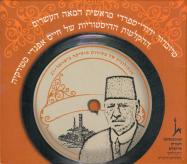(618 results found)
Qiddush (kidousche)
… Early Twentieth-Century Sephardi Troubadour: The Historical Recordings of Haim Effendi of Turkey … Historical recordings … Judeo-Spanish - Ladino … Ladino … Ladino - …
Las horas de la vida
… Early Twentieth-Century Sephardi Troubadour: The Historical Recordings of Haim Effendi of Turkey … Historical recordings … Judeo-Spanish - Ladino … Ladino … Liturgical …
Shir Hanamal
… Modern Hebrew Nation (1882-1948) … Children's Songs … Field recordings … Field work … Hebrew poets … Israeli Folk Songs …
Teivat Noah
… Modern Hebrew Nation (1882-1948) … Children's Songs … Field recordings … Field work … Hebrew poets … Israeli Folk Songs …
2. Grande displacer me haces (Jacob Algava)
… Cruela apiadate de m i (the melody is similar; see Attias’ recording in NSA Y 09509). The first two lines of the third …
3. Hermanos mis queridos (Jacob Algava)
… (Istanbul) of November 10, 1908. The second stanza of this recording is similar to the third stanza of Cante nuevo por …
4. La constitución se dió (Jacob Algava)
… that of a Western military march in a major mode. Algava’s recording is the only documentation of this song located so …
5. Madame Gaspar (Jacob Algava)
… Cohen 1998 , p. 241). Algava recorded it twice. The second recording (Odeon 46279, Madam Gaspard si choi al Tcharschi …
6. Cantiga de Hanum Dudún (Jacob Algava)
… what’s under it is mine”) are unique to the Salonican early recordings. Algava ends the recording with exclamations in Turkish. Una noche yo me armí …
9. Ah niña sin piadad (CES)
… too (Odeon 46136[?], 1906/7; Bresler ), but no copy of this recording has survived. Ah niña sin piadad y llena de …





